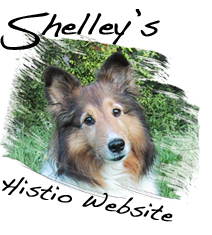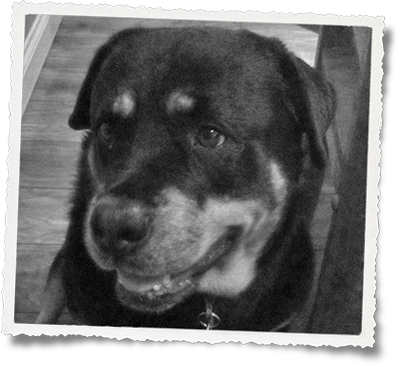
HOME
 YOUR HISTIO STORY
YOUR HISTIO STORY
I am looking for similarities
in all individual cases of
Histiocytic diseases.
I wonder if we all tell our
stories we might come up
with some commonality
between the specific
situations in which all of
our pets got this disease.
So please email me the
details and I'll put your
pets story on Shelley's
Histio Website
 UW HISTIO VERHAAL
UW HISTIO VERHAAL
Ik ben op zoek naar
overeenkomsten in alle
individuele gevallen van
Histiocytose.
Ik hoop dat wanneer wij
onze Histio verhalen
vertellen, wij overeen-
komsten ontdekken over
de manier waarop onze
huisdieren deze ziekte
hebben opgelopen.
Stuur mij de details en
ik zal het verhaal van uw
huisdier op de Histio
website van Shelley zetten.
 WARNING !
WARNING !
These stories are all
different. Individual
symptoms, situations
and circumstances
may vary and response to
therapy is not always the
same.
- Disclaimer -
 WAARSCHUWING !
WAARSCHUWING !
Deze verhalen zijn allemaal
verschillend. Individuele
symptomen, situaties en
omstandigheden kunnen
verschillen en de reactie
op therapie is niet altijd
hetzelfde.
- Disclaimer -
HISTIOCYTOSIS IN
OTHER LANGUAGES
German - Hund
Maligner Histiozytose
French - Chien
l'Histiocytose Maligne
Italian - Canis
Maligni Histiocytosis
Spanish - Perros
Histiocitosis Maligna
Dutch - Hond
Maligne Histiocytose
HOME
Phoenix
Histiocytic Sarcoma
Rottweiler
Female
November 21, 2004 - October 16, 2011


Story told by Jeannine and Ben S.
We adopted Phoenix in September 2005 when she was about 9 months old. She quickly became a loyal and integral part of our family. She enjoyed her walks and formed friendships with the neighbourhood dogs she met almost daily. Her favourites seemed to be the smaller breeds… Jack Russells and yorkies in particular. We’ve come to think Phoenix thought of herself as a small dog.
Phoenix had been slowing down for months, but not worryingly so. She was still keen on her walks, would still run after a ball, and she was still very keen on food, especially the people variety if she could get it. Given she was nearing her seventh birthday; we put this subtle change down to age and thought nothing more of it. By July/August 2011, Phoenix’s walking had gotten much slower. She’d start out on her journey full of enthusiasm, but by the end her pace was almost glacial. Again, we put this down to age and maybe the summer heat. She was still happy and eating and didn’t seem to be in any physical distress.
In mid-September Phoenix went off her food. She would still eat people food, but didn’t care much for her kibble. Thinking that the remainder of her food had gone off, we replaced the bag to see if that was the problem. It wasn’t. By this time Phoenix had lost a considerable amount of weight, so she was taken to the vet. Manipulation of her abdomen revealed a swollen spleen and she was booked in for scans and X-rays the next day. At this point Phoenix was still happy eating what we were eating and, even though walks had become more of a chore, she was still cheerful. Tests showed a growth on her spleen and she was booked in for a splenectomy on 23 September 2011. Surgery went well and Phoenix recovered quickly, becoming her normal bouncy self within days and wolfing down anything put in her bowl. The vet said there was no obvious signs of cancer in the abdominal or chest cavity, but we would have to wait a couple of weeks for the biopsy report to come back to know for sure. Things were looking positive. We were relieved.
As she was recovering from major abdominal surgery, we took our cues from Phoenix. Walks were a little slower, but she was keen to run with her friends. Two weeks passed and the biopsy results were in. It wasn’t good news… histiocytic sarcoma. Through our own research we knew her prognosis wasn’t good either. We were referred to a specialist to see what our options were.
Our appointment was on 11 October 2011 for another scan and X-ray. Within half an hour we knew the cancer had spread to Phoenix’s lymph nodes and had started on her lungs. The specialist explained that while she could start her on chemotherapy, the chances of it being successful with this type of aggressive cancer were very slim. Treatment would likely buy Phoenix only a few extra weeks… and they wouldn’t be very pleasant ones at that. After some discussion, we decided it wasn’t in her best interest to start chemo and set about making her remaining days as comfortable as possible.
Within days walks became shorter and more taxing as Phoenix quickly ran out of puff. She was off her food again, but still reasonably happy with people food in small doses. When she started turning away cheese, arguably her favourite of all foods, we knew she was on a serious decline. On Saturday, 15 October 2011 Phoenix’s legs failed while on her morning walk and she had to be ferried back home in the car. We hand fed her bits of chicken and mince as it was too uncomfortable for her to stand at her bowl and eat. That evening she managed to get up enough energy to cross the road to pee, her only movement that day. One of her evening rituals was often to “race” us back to the house after she had finished her business and it was utterly heart-breaking to see her barely able to walk that small distance. We took the difficult decision to end her suffering the next day.
Sunday, 16 October 2011 at around 10:30 our lovely Phoenix died on the floor of the vet’s examining room.
What we think is important to take away from Phoenix’s story is to not ignore any changes to energy levels, no matter how subtle and no matter what age. Before the diagnosis, we had never heard of histiocytic sarcoma. If we had known we could’ve taken Phoenix in months before when she first started slowing down. She may have had a fighting chance.

